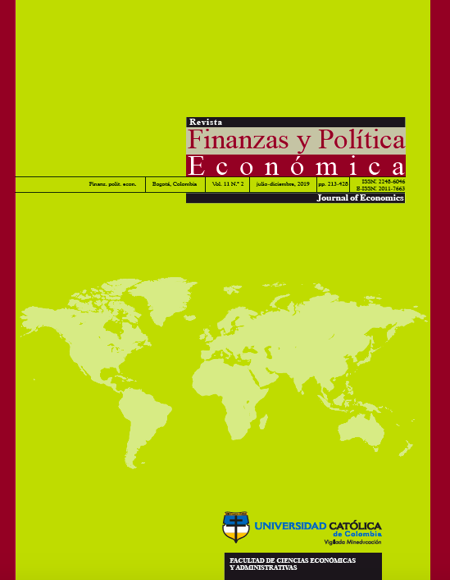This journal is licensed by a Creative Commons Attribution License (CC BY-NC-SA 4.0) Attribution-Non Commercial 4.0 International. For the CC licenses, the principle isthe creative freedom. This system complements the copyright without opposing it, conscious of its importance in our culture. The content of the articles is the responsibility of each author, and does not compromise in any way, to the journal or the university. It allows the transmission and reproduction of titles, abstracts and full content, with academic, scientific, cultural ends, provided acknowledgment of the respective source. This work cannot be used for commercial purposes.
They journal does not charge authors for submission or publication.
Abstract
This paper analyzes the main determinants of fiscal decentralization in a sample of eighty-four countries. The
empirical findings show that the most consistent variable affecting fiscal decentralization is the size of a country: as land size increases, the level of fiscal decentralization increases as well. Countries with higher income equality, an educated population, more democratic, more urbanized and open to trade are also more likely to be more decentralized, though the findings demonstrate that there are regional and income variations. The most important policy implication is that governments interested in deepening the devolution
of fiscal responsibilities to sub-national levels may consider acting to affect those variables that have been shown to exert a positive influence on this process.

References
Alesina, A., & Spolaore, E. (2003). The size of nations. Cambridge, MA: The MIT Press.
Arzaghi, M., & Henderson, V. (2005). Why countries are fiscally decentralizing. Journal of Public Economics, 89, 1157-1189.
Bodman, P., & Hodge, A. (2010). What drives fiscal decentralisation? Further assessing the role of income. Fiscal Studies, 31(3), 373-404.
Cai, H., & Treisman, D. (2006). Did government decentralization cause China’s economic miracle? World Politics, 5(4), 505-535.
Canavire-Bacarreza, G., Martinez-Vazquez, J., & Yedgenov, B. (2017). Reexamining the determinants of fiscal decentralization: What is the role of geography? Journal of Economic Geography, 17(6), 1209-1249.
Channa, A., & Faguet, J.P. (2016). Decentralization of health and education in developing countries: A Quality-adjusted review of the empirical literature. World Bank Research Observer, 31(2), 199-241.
Faguet, J.P. (2014). Decentralization and governance. World Development, 53, 2-13.
Faguet, J.P., & Pöschl, C. (2015). Is decentralization good for development? Perspectives from academics and policy makers. In Faguet, J.P. & Pöschl, C. (eds.). Is decentralization good for development? Perspectives from academics and policy makers. Oxford, UK: Oxford University Press.
Fedelino, A. & Smoke, P. (2013). Bridging public financial management and fiscal decentralization reforms in developing countries. In Cangiano, M.M., Curristine, M.T.R., &. Lazare, M.M. (Eds.). Public financial management and its emerging architecture (pp. 363-388). Washington, DC: International Monetary Fund.
Gadenne, L., & Singhal, M. (2014). Decentralization in developing economies. Annual Review of Economics, 6, 581-604.
Grazzi, M. & Jaramillo, F. (2015). Is Latin America on the path to achieving sustainable fiscal decentralization? In Faguet, J.P., & Pöschl, C. (Eds.). Is decentralization good for development? Perspectives from academics and policy makers (pp. 109-128). Oxford, UK: Oxford University Press.
Jametti, M., & Joanis, M. (2010). Determinants of fiscal decentralization: Political economy aspects. Document de treball de l’IEB 2010/7. Institut d’Economia de Barcelona. Retrieved from https://www.researchgate.net/publication/46469104_Determinants_of_fiscal_decentralization_political_economy_aspects
Jílek, M. (2015). Factors of tax decentralization in OECD-Europe countries. European Financial and Accounting Journal, 10(2), 33-49.
Letelier, L.S. (2005). Explaining fiscal decentralization. Public Finance Review, 33(2), 155-183.
Musgrave, R. (1959). The theory of public finance. New York, NY: McGraw Hill.
Musgrave, R. (1969). Theories of fiscal federalism. Public Finance, 24(4), 521-536.
Oates, W.E. (1972). Fiscal federalism. New York, NY: Harcourt Brace Jovanovich,
Oates, W.E. (1999). An essay on fiscal federalism. Journal of Economic Literature, 37(3), 1120-1149.
Oates, W.E. (2007). On the theory and practice of fiscal Decentralization. CREI Working Paper no 1/2007. Retrieved from http://host.uniroma3.it/centri/crei/pubblicazioni/workingpapers2007/CREI_01_2007.pdf
Panizza, U. (1999). On the determinants of fiscal centralization: Theory and evidence. Journal of Public Economics, 74, 97-139.
Rodden, J. (2004). Comparative federalism and decentralization: On meaning and measurement. Comparative Politics, 36(4), 481-500.
Treisman, D. (2006). Explaining fiscal decentralisation: Geography, colonial history, economic development and political institutions. Commonwealth & Comparative Politics, 44:3, pp. 289-325.
Samuelson, P.A. (1954). The pure theory of public expenditure. The Review of Economics and Statistics, 36(4), 387-389.
Smoke, P. (2015). Rethinking decentralization: Assessing challenges to a popular public sector reform. Public Administration and Development, 35(2), 97-112.
Stegarescu, D. (2009). The effects of economic and political integration on fiscal decentralization: Evidence from OECD countries. Canadian Journal of Economics, 42(2), 694-718.
Tiebout, C.M. (1956). A pure theory of local expenditures. Journal of Political Economy, 64, 416-424.






























